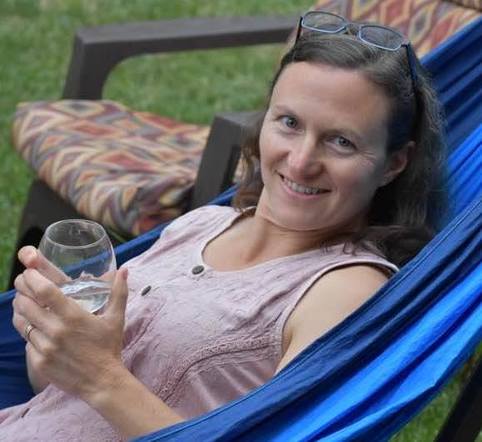 Dani Coleman lives an idyllic life in Louisville, CO. If she could double the hours in a day, she would still not have enough time to write. When I was in first grade, I made my sister hold down the shift key on my mom’s typewriter so I wouldn’t have to worry about capitalization as I wrote a story. Although the anecdote lives in my family’s repertoire to illustrate how poorly I treated my dear sister, not to mention my lack of knowledge of shift-lock, I have no recollection of the actual story. But its existence marked the beginning of my call to be a writer. Not that I’ve made it a priority throughout my life. When it came time to choose a major in college, I studied math and science because I felt I needed the professors and homework sets in order to learn that material, where as I could read and write on my own. As an undergraduate, I often took a literature or composition class, not necessarily to learn anything but to reserve time in my life for reading and writing. This slipped away with the singular focus that was necessary to get a master’s degree, but by the time I got a job as a computer programmer, I knew I needed to build writing time into my life again. A personal project to read John Steinbeck’s entire oeuvre, including his mediocre first novel, led me to the conclusion that short stories would be a good way to hone my skills. To explore outside my comfort range and give me deadlines, I asked my husband to come up with assignments. I found that I was most inspired by what-ifs: not fantasy or science fiction exactly, but speculative variations on reality. So, I was receptive to a short blurb in Wired Magazine calling for fiction set in a climate-changed world. This was shortly after the term “cli fi” came to be used for climate fiction, whether speculative or not, and I realized I was uniquely positioned to write it. As a programmer on a climate models, I have easy access to intelligent society’s best projection to what the earth will be like in the future. And I’m already a writer. One morning on my hike to work, I realized that a climate-changed world would be a perfect setting for a character who had been wandering around my head. Woe to those who fall pregnant in post-apocalyptic Colorado. As I played with the idea, I realized it wasn’t going to fit into a short story. With some panic—our third child was one year old, I worked part-time and taught karate in the evenings—I calculated that I could write a novel in a year if I wrote five hundred words per day. It actually took one year and nine months. As I was finishing the first draft, a newsletter at work profiled another programmer and it mentioned that she also wrote fiction. She mentioned that Rocky Mountain Fiction Writers and I was intrigued enough by their website to attend their annual conference that fall. My first Colorado Gold conference was the biggest turning point in my writing career. Simply being around hundreds of people who were as excited as I was about writing revealed how important a part of my life this was. As the conference chair said, I’d found my tribe. I met people at various stages of their careers, and the conference provided workshops that should help me to attain those levels. And one of those hundreds of people was a neighbor of mine, who told me of a writing group in my hometown of Louisville, CO, owned by author Rachel Weaver. At the first speculative-fiction critique group hosted by the group, now a northern branch of Lighthouse, I met critique partners and began the long process of figuring out what needed to change in my novel. Rachel is one of those teachers who sprinkles all of her workshops with gems that make even the most basic lesson worthwhile. One of my favorites is that the first draft is you telling yourself the story and then you have to figure out how to tell others. It took over a year for me to re-balance the risk versus reward in the opening of my novel to make it believable to more than ten percent of readers, another year to show my protagonist’s strengths as well as her weaknesses and yet another to make the plot authentically exciting. This fall, I hope to be ready to pitch a complete, polished novel. My baby ages with the manuscript and she’ll almost be seven years old. No matter; one thing I’ve learned is that I’d rather work toward quality rather than deadlines. Meanwhile, I’ve had the idea to write a middle-grade novel to appeal to boys like my nephew, incorporating timely social justice themes. I had expected to revise some short stories and perhaps write a sequel to my current manuscript, but one more thing I’ve learned from writing it is to go where the ideas take me. http://www.wordsbycoleman.com/
0 Comments
Leave a Reply. |
AuthorI'm generally pulled in a million different directions and I wouldn't trade it for the world. Here's a glimpse of my life - hope you enjoy it! And if there's a big lapse between posts, well, that's the way life goes in Amy's world. Archives
October 2022
Categories
All
|
|
Copyright 2024 by Amy Rivers. All rights reserved. |
 RSS Feed
RSS Feed